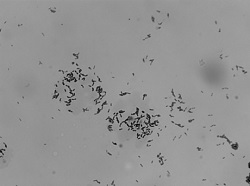Research work involving the microbiome--that vast population of bacteria that inhabits the human body, which outnumber cells by 10 to 1--has been exploding (in a good way) in recent years as scientists explore its role in promoting or debilitating our health. And now a group of researchers at Cornell says they have identified one family of bacteria, the Christensenellaceae, that appears to play a big role in keeping us lean.
 |
| Christensenellaceae bacteria--Courtesy of Cornell |
To explore the role of bacteria on weight gain, the scientists recruited 416 pairs of twins, according to a report in the Wall Street Journal. They found that Christensenellaceae bacteria are predominant in the lean twins, and then tested their theory in mice. Germ-free mice that were given transplants of the bacteria weighed less than the control group of mice that were not treated after a 21-day period.
The next step in the animal program will be to give the bacteria to mice orally rather than through a fecal transplant to see if they can get a durable response.
A significant part of the microbiome research in the U.S. is being handled by the NIH's Human Microbiome Project. And initial animal studies like this weight project represent just the tip of the iceberg in terms of the role that bacteria plays in human health. Much, much more work will be needed before any new microbiome-related therapies for obesity or other ailments make it to the market.
 |
| Rob Knight |
But the potential here is huge, with a variety of factors playing a role in the microbiome.
"We're finding that the microbiome is affected not just by age and antibiotics, but how many plants you eat, how much alcohol you drink, how much you exercise and how much sleep you get on average," microbiologist Rob Knight, the project's co-founder at Cornell, tells the WSJ.
- here's the story from the Wall Street Journal (sub. req.)